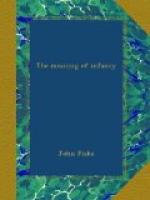exactly in the steps of its predecessor, yet the circumstances
of primitive society long made it very difficult for
any deviation to be effected. For the tribes
of primitive men were perpetually at war with each
other, and their methods of tribal discipline were
military methods. To allow much freedom of thought
would be perilous, and the whole tribe was supposed
to be responsible for the words and deeds of each
of its members. The tribes most rigorous in
this stern discipline were those which killed out
tribes more loosely organized, and thus survived to
hand down to coming generations their ideas and their
methods. From this state of things an intense
social conservatism was begotten,—a strong
disposition on the part of society to destroy the flexible-minded
individual who dares to think and behave differently
from his fellows. During the past three thousand
years much has been done to weaken this conservatism
by putting an end to the state of things which produced
it. As great and strong societies have arisen,
as the sphere of warfare has diminished while the sphere
of industry has enlarged, the need for absolute conformity
has ceased to be felt, while the advantages of freedom
and variety come to be ever more clearly apparent.
At a late stage of civilization, the flexible or
plastic society acquires even a military advantage
over the society that is more rigid, as in the struggle
between French and English civilization for primacy
in the world. In our own country, the political
birth of which dates from the triumph of England in
that mighty struggle, the element of plasticity in
man’s nature is more thoroughly heeded, more
fully taken account of, than in any other community
known to history; and herein lies the chief potency
of our promise for the future. We have come to
the point where we are beginning to see that we may
safely depart from unreasoning routine, and, with
perfect freedom of thinking in science and in religion,
with new methods of education that shall train our
children to think for themselves while they interrogate
Nature with a courage and an insight that shall grow
ever bolder and keener, we may ere long be able fully
to avail ourselves of the fact that we come into the
world as little children with undeveloped powers wherein
lie latent all the boundless possibilities of a higher
and grander Humanity than has yet been seen upon the
earth.
II
THE PART PLAYED BY INFANCY IN THE EVOLUTION OF MAN
The remarks which my friend Mr. Clark has made with reference to the reconciling of science and religion seem to carry me back to the days when I first became acquainted with the fact that there were such things afloat in the world as speculations about the origin of man from lower forms of life; and I can recall step by step various stages in which that old question has come to have a different look from what it had thirty years ago. One of the commonest objections




